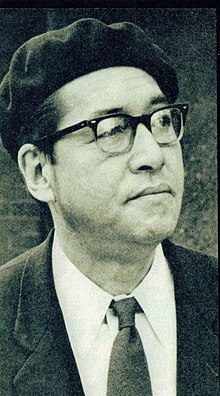Kōzaburō Yoshimura
Kōzaburō Yoshimura | |
|---|---|
 Yoshimura in January 1967 | |
| Born | 9 September 1911 |
| Died | 7 November 2000 (aged 89) |
| Other names | Kimisaburo Yoshimura |
| Occupation | Film director |
| Years active | 1929-1974 |
Kōzaburō Yoshimura (吉村 公三郎, Yoshimura Kōzaburō, 9 September 1911 – 7 November 2000) was a Japanese film director.
Biography
Born in Shiga Prefecture, he joined the Shōchiku studio in 1929.[2] He debuted as director in 1934, but continued working as an assistant director for such filmmakers as Yasujirō Ozu and Yasujirō Shimazu after that.[citation needed] It was the 1939 film Warm Current that established his status as a director.[1][2] During the Sino-Japanese war he directed a number of military dramas such as The Legend of Tank Commander Nishizumi (1940), for which he toured the actual battlefields in China.[3] His 1947 work The Ball at the Anjo House, starring Setsuko Hara, was named the best picture of the year by Kinema Junpo.[1] This film marked the start of a long relationship with the screenwriter and film director Kaneto Shindō. In 1950, the two of them started the independent production company Kindai Eiga Kyokai.[1][2]
Yoshimura is credited with furthering the careers of such actresses as Fujiko Yamamoto, Machiko Kyō and Ayako Wakao.[1] He directed over 60 films during his career,[4] and received a Medal of Honor (Purple Ribbon) from the Japanese government in 1976.[1]
Selected filmography
- Warm Current (暖流, Danryū) (1939)
- The Legend of Tank Commander Nishizumi (1940)
- The Spy isn't Dead Yet (1942)
- The Ball at the Anjo House (安城家の舞踏会, Anjō-ke no butōkai) (1947)
- The Tale of Genji (1951)
- Before the Dawn (1953)
- Epitome (1953) (producer only)
- Life of a Woman (1953) (producer only)
- Ginza no onna (1955)
- Night River (1956)
- An Osaka Story (1957)
- A Woman's Uphill Slope (女の坂, Onna no saka) (1960)
- A Woman's Testament (女経, Jokyō) (1960) (episode "The Woman Who Forgot to Love")
References
- ^ a b c d e f "Obituary: Kozaburo Yoshimura". Japan Times. Retrieved 26 July 2010.
- ^ a b c "Yoshimura Kōzaburō". Nihon jinmei daijiten (in Japanese). Kōdansha. Retrieved 4 December 2010.
- ^ High, Peter B. (2003). The Imperial Screen. Wisconsin Studies in Film. The University of Wisconsin Press. pp. 211–217. ISBN 0-299-18134-0.
- ^ "Yoshimura Kōzaburō". Japanese Movie Database (in Japanese). Retrieved 4 December 2010.
External links
- Kōzaburō Yoshimura at IMDb
- Kōzaburō Yoshimura at the Japanese Movie Database (in Japanese)
